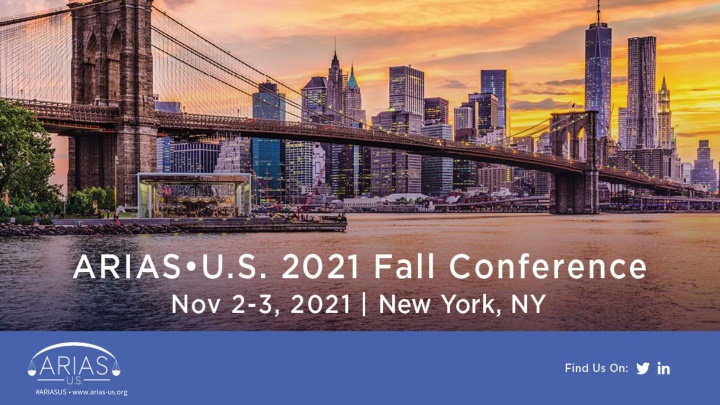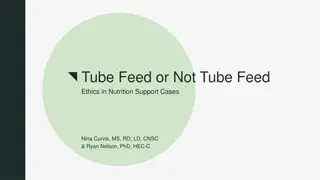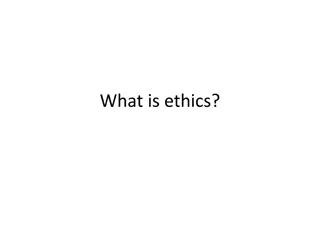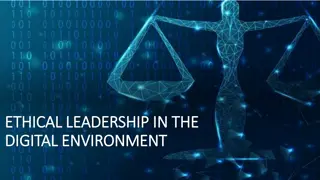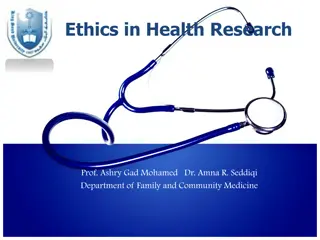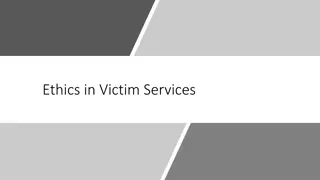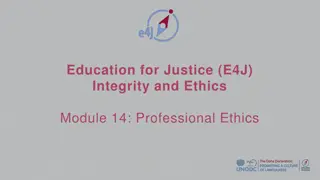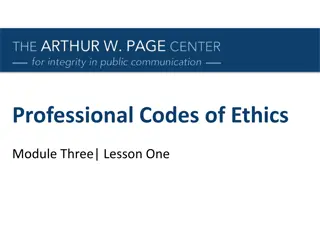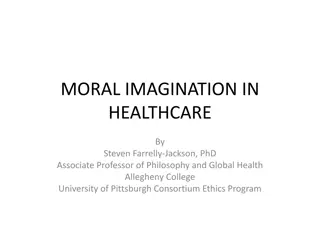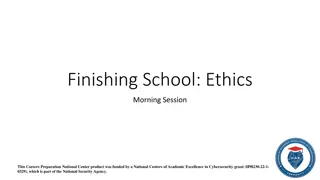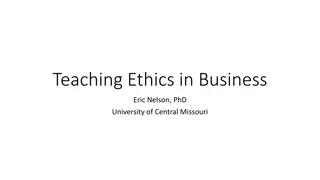Rules-Based vs. Principles-Based Approach to Ethics: Key Differences
In the realm of ethics, understanding the distinction between rules-based and principles-based approaches is crucial. While rules provide clarity and enforceability, principles offer flexibility and unified guidance. Explore the benefits and downsides of each methodology, as exemplified by the ARIAS U.S. Code of Conduct's evolution toward a hybrid model.
Download Presentation

Please find below an Image/Link to download the presentation.
The content on the website is provided AS IS for your information and personal use only. It may not be sold, licensed, or shared on other websites without obtaining consent from the author.If you encounter any issues during the download, it is possible that the publisher has removed the file from their server.
You are allowed to download the files provided on this website for personal or commercial use, subject to the condition that they are used lawfully. All files are the property of their respective owners.
The content on the website is provided AS IS for your information and personal use only. It may not be sold, licensed, or shared on other websites without obtaining consent from the author.
E N D
Presentation Transcript
Dont Go Breaking the Rules: But What About the Principles? Ethics Presentation Fall Conference 2021
Rules Based vs. Principles Based Approach to Ethics What s the Difference? Rules Based an approach to ethics where the appropriateness of an action is based on prescribed rules Principles Based an approach that focuses on general principles and best practices ARIAS U.S. 2021 Fall Conference | Nov 2-3, 2021 | New York, NY | www.arias-us.org
Difference Between Rules and Principles Examples: Rules Based: It is illegal to drive with a BAC of .08% or higher. Principles Based: Please consume alcohol responsibly. Rules Based: A candidate must refuse to serve as an umpire if they are currently an expert witness for one of the parties. Principles Based: Arbitrators should uphold the integrity of the arbitration process. ARIAS U.S. 2021 Fall Conference | Nov 2-3, 2021 | New York, NY | www.arias-us.org
Some Key Differences Rules Based Approach Benefits Clarity, less room for misunderstanding or misapplication Enforcement is easier Downsides Too authoritarian Too rigid, one size does not fit all ARIAS U.S. 2021 Fall Conference | Nov 2-3, 2021 | New York, NY | www.arias-us.org
Some Key Differences Cond Principles Based Approach Benefits More flexibility on how outcome is achieved Self-policing Provides unified guidance to infinite variations Downsides More room for misunderstanding Enforcement is more difficult Inconsistent approach to implementation ARIAS U.S. 2021 Fall Conference | Nov 2-3, 2021 | New York, NY | www.arias-us.org
ARIASU.S. Code of Conduct A Brief History 1998 - The Guidelines (a.k.a. the ARIAS U.S. Guidelines for Arbitrator Conduct) were adopted. They focused on best practices and did not contain mandatory rules. 2010 - The Guidelines were supplemented with Additional Ethics Guidelines and mandatory rules were added for the first time. 2014 - ARIAS U.S. adopted the Code of Conduct, which is a hybrid of principles and rules-based ethics. ARIAS U.S. 2021 Fall Conference | Nov 2-3, 2021 | New York, NY | www.arias-us.org
Current Code of Conduct, A Hybrid Approach Rules Based Examples: An arbitrator must refuse to serve if: They have a material financial interest in a party that could be substantially affected by the outcome of the proceedings Where they are nominated for the role of umpire and currently serve as a consultant or expert for one of the parties Canon I, Comment 3(a), (d) ARIAS U.S. 2021 Fall Conference | Nov 2-3, 2021 | New York, NY | www.arias-us.org
Current Code of Conduct, A Hybrid Approach Principles Based Examples: Arbitrators should uphold the integrity of the arbitration process (Canon I) Arbitrators, in communicating with the parties, should avoid impropriety or the appearance of impropriety (Canon V) Arbitrators should be faithful to the relationship of trust and confidentiality inherent in their position (Canon VI) ARIAS U.S. 2021 Fall Conference | Nov 2-3, 2021 | New York, NY | www.arias-us.org
Are the Rules Swallowing the Principles? The rules don t say I can t is not the end of the ethical inquiry How do/should we think about the principles? ARIAS U.S. 2021 Fall Conference | Nov 2-3, 2021 | New York, NY | www.arias-us.org
Vignette No. 1 Jones was once retained by a ceding company in a litigation involving an allegation of late notice by the reinsurer. In that litigation, Jones testified that, in the industry, late notice was considered a purely technical error, that it could be cured per the E&O Clause, and that in any event it could not be sustained as a defense in the absence of material prejudice to the reinsurer. Subsequently, a ceding company appointed Jones as an arbitrator in an arbitrationwhere the reinsurer s sole defense was late notice of the claim. Should Jones have accepted the assignment? ARIAS U.S. 2021 Fall Conference | Nov 2-3, 2021 | New York, NY | www.arias-us.org
Vignette No. 2 Amy Snow recently retired as in-house legal counsel where, from 2005-2015, she managed reinsurance disputes for a company that had a significant book of ceded and assumed reinsurance. In that capacity, Ms. Snow or her staff regularly hired Eddy Limits. All told, Ms. Snow s department and Mr. Limits worked together on three matters that went to hearing, five that settled before hearing and another twenty where Mr. Limits provided counsel. During that ten-year period, Ms. Snow believes that she paid Mr. Limits over $2 million, which was the largest single firm/company relationship that Ms. Snow ever managed. In 2009, Mr. Limits and two of his associates had Thanksgiving with Ms. Snow because of weather and hearing dates that had been squeezed into the holiday week. After 2015, Ms. Snow moved to a specialty assuming reinsurer. In her new role, she rarely needed outside counsel, but she and Mr. Limits remained friends, often having dinners together, and even going on the occasional vacation with each other and their respective families. Ms. Snow retired in 2021 and is now an ARIAS certified arbitrator/umpire. She received a questionnaire from a client who is represented by Mr. Limits. She answers the questions truthfullynoting that "more than 10 years ago she managed multiplematters with Mr. Limits as counsel" but discloses nothing more about their relationship. Were Ms. Snow s disclosures appropriate? ARIAS U.S. 2021 Fall Conference | Nov 2-3, 2021 | New York, NY | www.arias-us.org
Vignette No. 3 On November 2, 2021, Smith receives an Umpire Questionnaire in an arbitration involving ABC Insurance Company and its counsel Big Law Firm and Gold Star Reinsurer and its counsel Really Big Law Firm. Like many of her peers, Smith's general practice has been to issue invoices after an organizational meeting and after the final award in an arbitration. Smith has issued invoices and received payment on all the arbitrations that have proceeded to final award in the last 5 years, except for a mid-October arbitration for which Smith has issued an invoice but hasn't received payment. After reviewing the Code of Conduct, Canon I, Comment 4, as well as her records, Smith determines that the payments she has received from ABC Insurance Company in the last 5 years do not represent a significant percentage of the total revenue earned as an arbitrator and she sees no issue with her serving as an umpire in the new matter. In reaching her decision, Smith did not consider the payment she expects to receive from the mid-October arbitration because she hasn't yet received it. This payment, however, will represent a significant percentage of her overall revenue. Should Smith have considered the payment as revenue? ARIAS U.S. 2021 Fall Conference | Nov 2-3, 2021 | New York, NY | www.arias-us.org
Vignette No. 4 The parties have appointed Arbitrator A and B as their party-appointed arbitrators and are about to exchange umpire candidate names. Before the exchange, Arbitrator A makes social calls to 6 people he s considering as umpire candidates just to check on what s happening with them. During the call, Arbitrator A states that he is busy with some ongoing matters, including one where Arbitrator B is on the other side, but Arbitrator A doesn t name the matter or discuss the substance. Does Arbitrator A s conduct violate the rules or spirit of the Code of Conduct? ARIAS U.S. 2021 Fall Conference | Nov 2-3, 2021 | New York, NY | www.arias-us.org
Thank you! ARIAS U.S. 2021 Fall Conference | Nov 2-3, 2021 | New York, NY | www.arias-us.org
